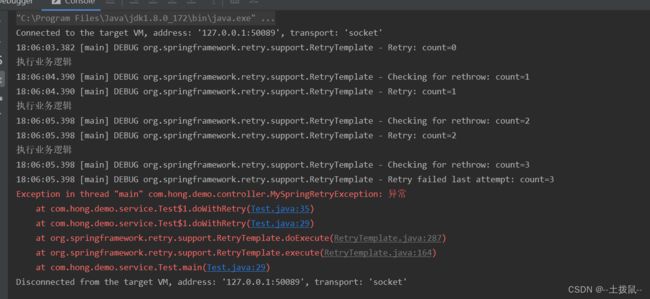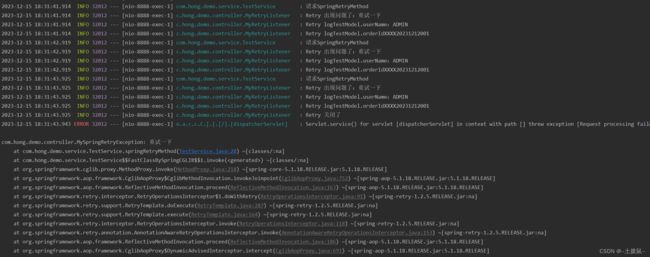优雅处理失败:深入了解 Spring Retry
优雅处理失败:深入了解 Spring Retry
在分布式系统中,处理失败和异常是不可避免的任务。Spring Retry 是 Spring 生态系统中一个强大的库,它提供了一种优雅的机制来处理失败的操作,通过重试来增加系统的鲁棒性。本文将深入介绍 Spring Retry 的核心概念、用法以及如何在 Spring Boot 中应用它。
1. 为什么需要重试?
在分布式系统中,服务之间的调用、数据库操作、远程服务请求等可能面临各种故障,例如网络超时、服务不可用等。重试机制能够有效地应对这些瞬时性的故障,提高系统的可用性。
Spring Retry 提供了一种声明式的方式,允许开发者定义重试策略,并集成到业务逻辑中,从而减少样板代码,使代码更加清晰和可维护。
2. Spring Retry 核心概念
2.1 RetryTemplate
RetryTemplate 是 Spring Retry 的核心类之一。它定义了一个重试操作的模板,包括了重试策略、重试间隔、重试次数等。通常,我们使用 RetryTemplate 的 execute 方法来执行需要重试的业务逻辑。
RetryTemplate retryTemplate = new RetryTemplate();
retryTemplate.execute(context -> {
// 重试的业务逻辑
// ...
return result;
});
2.2 RetryPolicy
RetryPolicy 定义了重试的策略。Spring Retry 提供了一些内置的实现,如 SimpleRetryPolicy、ExponentialBackOffPolicy 等。开发者也可以根据自己的需求实现自定义的 RetryPolicy。
RetryPolicy retryPolicy = new SimpleRetryPolicy(3);
上述示例中,SimpleRetryPolicy 表示最多重试 3 次。
2.3 BackOffPolicy
BackOffPolicy 定义了在重试操作之间的等待时间。Spring Retry 也提供了一些内置的实现,如 FixedBackOffPolicy、ExponentialBackOffPolicy。
BackOffPolicy backOffPolicy = new ExponentialBackOffPolicy();
2.4 RetryListener
RetryListener 允许我们在重试的不同阶段注册监听器,以执行一些自定义的逻辑。例如,在重试开始、重试成功、重试失败等时机执行特定的操作。
RetryListener retryListener = new MyRetryListener();
3. 在 Spring Boot 中使用 Spring Retry
Spring Boot 对 Spring Retry 进行了集成,使用它变得更加简单。以下是在 Spring Boot 项目中使用 Spring Retry 的基本步骤:
3.1 引入依赖
在 pom.xml 文件中添加 Spring Retry 依赖:
<dependency>
<groupId>org.springframework.bootgroupId>
<artifactId>spring-boot-starterartifactId>
dependency>
3.2 使用RetryTemplate
import org.springframework.retry.RetryCallback;
import org.springframework.retry.RetryContext;
import org.springframework.retry.RetryPolicy;
import org.springframework.retry.backoff.FixedBackOffPolicy;
import org.springframework.retry.policy.SimpleRetryPolicy;
import org.springframework.retry.support.RetryTemplate;
public class Test {
public static void main(String[] args) {
// 创建一个retry模板
RetryTemplate retryTemplate = new RetryTemplate();
// 重试的次数
RetryPolicy retryPolicy = new SimpleRetryPolicy(3);
// 重试的时间间隔
FixedBackOffPolicy backOffPolicy = new FixedBackOffPolicy();
backOffPolicy.setBackOffPeriod(1000); // 1秒
retryTemplate.setRetryPolicy(retryPolicy);
retryTemplate.setBackOffPolicy(backOffPolicy);
// 执行重试的逻辑,并返回结果
String result = retryTemplate.execute(new RetryCallback<String, RuntimeException>() {
@Override
public String doWithRetry(RetryContext context) throws RuntimeException {
System.out.println("执行业务逻辑");
if (Math.random() < 0.8) {
throw new MySpringRetryException("异常");
}
return "success";
}
});
}
}
3.2 在方法上添加 @Retryable 注解并自定义监听器、动态传参
使用注解
@Slf4j
@Service
public class TestService {
@Retryable(value = MySpringRetryException.class,maxAttempts = 3,backoff =@Backoff(delay = 1000),listeners = {"myRetryListener"})
public void springRetryMethod(){
log.info("请求SpringRetryMethod");
LogTestModel logTestModel = new LogTestModel();
logTestModel.setOrderId("XXXX20231212001");
logTestModel.setUserName("ADMIN");
// 动态传参到MyRetryListener中获取
RetryContext context = RetrySynchronizationManager.getContext();
context.setAttribute("logTestModel",logTestModel);
throw new MySpringRetryException("重试一下");
}
}
定义监听器
@Slf4j
@Component
public class MyRetryListener extends RetryListenerSupport {
@Override
public <T, E extends Throwable> void onError(RetryContext context, RetryCallback<T, E> callback, Throwable throwable) {
LogTestModel logTestModel = (LogTestModel) context.getAttribute("logTestModel");
log.info("Retry 出现问题了:" + throwable.getMessage());
log.info("Retry logTestModel.userName:" + logTestModel.getUserName());
log.info("Retry logTestModel.orderId" + logTestModel.getOrderId());
}
@Override
public <T, E extends Throwable> boolean open(RetryContext context, RetryCallback<T, E> callback) {
return super.open(context, callback);
}
// 重试完成的时候调用
@Override
public <T, E extends Throwable> void close(RetryContext context, RetryCallback<T, E> callback, Throwable throwable) {
log.info("Retry 关闭了");
}
}
自定义的异常
public class MySpringRetryException extends RuntimeException {
private static final long serialVersionUID = 1L;
private Integer code;
private String message;
public MySpringRetryException() {
}
public MySpringRetryException(String message) {
this.message = message;
}
public MySpringRetryException(String message, Integer code) {
this.message = message;
this.code = code;
}
@Override
public String getMessage() {
return message;
}
public Integer getCode() {
return code;
}
public MySpringRetryException setMessage(String message) {
this.message = message;
return this;
}
}
在上述示例中,@Retryable 注解标记了一个可能会重试的方法。value 属性指定了需要触发重试的异常类型,maxAttempts 指定了最大重试次数,backoff 指定了重试间隔。
3.3 在配置类上添加 @EnableRetry 注解
@Configuration
@EnableRetry
@EnableAspectJAutoProxy
public class AppConfig {
}
通过在启动类上添加 @EnableRetry 注解,开启了 Spring Retry 的支持。
4. 总结
Spring Retry 是一个强大的库,可以轻松处理分布式系统中的失败和异常。通过声明式的方式定义重试策略,减少了样板代码,使得代码更加清晰和可维护。
在使用 Spring Retry 时,需要根据具体的业务场景选择合适的重试策略、重试间隔等参数。合理使用重试机制可以提高系统的可用性和鲁棒性。
启动类上添加 @EnableRetry 注解,开启了 Spring Retry 的支持。
4. 总结
Spring Retry 是一个强大的库,可以轻松处理分布式系统中的失败和异常。通过声明式的方式定义重试策略,减少了样板代码,使得代码更加清晰和可维护。
在使用 Spring Retry 时,需要根据具体的业务场景选择合适的重试策略、重试间隔等参数。合理使用重试机制可以提高系统的可用性和鲁棒性。

